Inclusion and Integration Week 2024 Begins
Promoting Dublin, a City for all, and encouraging social inclusion, integration and diversity
Launch of Community Perspectives on Health Needs and Assets in Sláintecare Healthy Community Programme Areas in Dublin report
 The launch of this report marks the the start of Dublin City’s Inclusion and Integration Week. This weeklong programme will see the city host multiple events, workshops and talks, each of which will promote equity and encourage attendees to become agents of change in their communities.
The launch of this report marks the the start of Dublin City’s Inclusion and Integration Week. This weeklong programme will see the city host multiple events, workshops and talks, each of which will promote equity and encourage attendees to become agents of change in their communities.
Inclusion and Integration Week will take place from Monday 11th – Sunday 17th November throughout Dublin City. The aim of the week is to highlight the positive work carried out by Dublin City Council and other agencies to promote social inclusion, integration and diversity in our city. The week’s events are organised by Dublin City Council’s Housing and Community Services Department working collaboratively with a range of delivery partners.
There are a variety of cultural and wellbeing events for people from all walks of life. Some of the events taking place throughout the week include practical language workshops, exhibitions, health & wellbeing seminars and live music. Events taking place can be viewed on www.dublincityinclusion.ie.
Speaking in advance of the opening event of this year’s Inclusion and Integration Week, the Lord Mayor of Dublin James Geoghegan said “Our programme this year represents the best of social inclusion and integration initiatives in Dublin City. I’m delighted to see that Dublin is home to so many fantastic organisations, and am eager for their good work to continue. Our opening event is indicative of the positive work that can be achieved when collaboration, real inclusion and active listening exists between stakeholders and communities, work that makes Dublin more equitable for all”.
The Community Perspectives report represents a crucial step towards enhanced and targeted social inclusion and community empowerment in Dublin’s disadvantaged areas. The findings highlight meaningful and structured engagement processes in communities in Dublin to make health experiences more equitable and inclusive for residents of those areas. Recommendations from the report include:
- Declaring a National Health Inequalities Emergency with dedicated task forces to tackle community-specific health issues.
- Creating tailored Community Engagement Plans across SHCP areas to promote effective collaboration and capacity-building.
- Improving access to primary care services by reducing waiting times and travel distances, and ensuring funding prioritises disadvantaged areas.
- Investing in early childhood and youth services to support vulnerable families, reduce waiting lists, and expedite referrals for children with special needs.
Local-level recommendations highlight:
- Strengthening mental health and addiction services through expanded support, trauma-informed training, and local peer support workers.
- Increasing investment in children and youth services and providing education on mental health and addiction, with schools adopting a ‘whole child approach’.
- Enhancing community safety by improving policies for high-risk households and fostering collaboration with Gardaí.
- Boosting affordable childcare access to help parents re-enter work or education, and exploring derelict buildings for community spaces.
The Report highlights the need for a fairer distribution of health and opportunities so that every child and adult in Ireland has the opportunity to reach their full potential.
Professor Debbi Stanistreet, Associate Professor and Head of Public Health and Epidemiology at RCSI’s School of Population Health who led the research , said “I’m pleased to present our findings, which we collated through engagement with the local communities. Their lived experience forms the basis of this report and is reflected in actionable recommendations, at both local and national levels. I look forward to seeing the recommendation implemented.”
The local communities who engaged with the project are Ballyfermot/ Cherry Orchard, Priorswood/ Kilmore West and Finglas/ Cabra.
Vinnie O’Shea, National Co-Ordinator of Sláintecare Healthy Communities, spoke of the report launch and said “This report is just the beginning of what ultimately will be significant work done to truly implement social inclusion in health across these communities. Health and social care are reliant upon these voices, and we’re very grateful for the participants in these studies for engaging with us, and excited to see the positive effects resulting from this report.”
The Community Perspectives on Health Needs and Assets in Sláintecare Healthy Community Programme Areas in Dublin report can be downloaded from HERE.
NOTE TO EDITORS:
Dublin City Council Social Inclusion Unit
Dublin City Council’s Social Inclusion Section works actively in the development and promotion of social inclusion initiatives, events, projects and programmes throughout Dublin city. The work of the Social Inclusion Section is guided by Dublin City Council’s Corporate Plan 2020-2024.
Aims of the Social Inclusion Section include:
- Highlighting the positive work that Dublin City Council and other agencies are involved in to reduce social exclusion and poverty
- Promoting an understanding of inclusion in Dublin city
- Celebrating diversity across the city
The Social Inclusion Section works closely and in partnership with:
- Community and voluntary groups
- Non-government organisations
- State agencies and social partners
- Dublin City Public Participation Network
- Other Dublin City Council departments and sections
Some of the work of the Social Inclusion Section can be seen by the following actions:
- Diverse community initiatives
- Social inclusion Week
Contact: socialinclusion@dublincity.ie
More information about Inclusion and Integration Week is available from www.dublincityinclusion.ie. #DublinCityInclusion24
Sláintecare Healthy Communities Programme (SHCP), which was launched in 2021 by Sláintecare Healthy Ireland in the Department of Health, working with the Health Service Executive and local authorities and community agencies, focuses specifically on promoting health and wellbeing at the community level.
This involves initiatives aimed at preventive healthcare, health promotion, and addressing the social determinants of health. Local Authorities have employed Local Development Officers and have been provided funding to improve public realm and fund locally identified projects to improve health and wellbeing. The Department of Health are working across Government with the Sláintecare Oversight Group to coordinate interventions and policy responses. This involves initiatives aimed at preventive healthcare, health promotion, and addressing the social determinants of health. As a result, health literacy is a key area of focus for the Sláintecare Healthy Communities Programme.
Dublin City Council is delivering Sláintecare Healthy Communities Programme locally in partnership with the HSE and community agencies. Dublin City has four Healthy Community Programme areas –Ballyfermot/ Cherry Orchard, Ballymun, Priorswood/ Kilmore West and Finglas/ Cabra.
About RCSI University of Medicine and Health Sciences
RCSI University of Medicine and Health Sciences is ranked fifth in the world for its contribution to UN Sustainable Development Goal 3, Good Health and Well-being, in the Times Higher Education (THE) University Impact Rankings 2024.
Founded in 1784 as the Royal College of Surgeons in Ireland with responsibility for training surgeons in Ireland, today RCSI is an innovative, not-for-profit, international university exclusively focused on driving improvements in human health worldwide through education, research and engagement.
RCSI is among the top 300 universities worldwide in the World University Rankings (2025) and has been awarded Athena Swan Bronze accreditation for positive gender practice in higher education.
In 2026, RCSI will open a new public engagement space, dedicated to health and well-being, at 118 St Stephen’s Green in Dublin city centre. The space is designed to engage the public in dialogue about living longer, healthier and happier lives through dynamic events and exhibitions. Our aim is to bridge the gap between health sciences research, professional expertise, and public understanding, empowering people to make informed decisions about their health.
Visit the RCSI MyHealth Expert Directory to find the details of our experts across a range of healthcare issues and concerns. Recognising their responsibility to share their knowledge and discoveries to empower people with information that leads them to better health, these clinicians and researchers are willing to engage with the media in their area of expertise.











